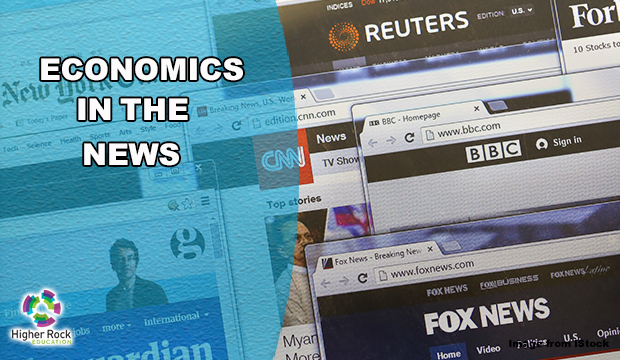
Economics in the News – Aug. 7-13, 2023
Economics impacts our lives every day. Below are some of the top storylines from this past week related to economics.
o American ports are behind port facilities in Asia and Europe with their automation abilities, frustrating shipping executives worldwide. Automation can help break the bottlenecks that can arise at ports that handle thousands of containers every day. Industry experts believe that the United States must automate to safeguard the country’s supply chains and remain competitive compared to their peers in regard to cost and timesaving efficiencies.
However, US officials say that the greatest hurdles to expanded automation is space constraints, the difficulty in getting a return on investment, and fierce opposition from labor unions. Space is also much more limited at American ports because of their proximity to large, metropolitan areas, compared to ports such as Khalifa Port in Abu Dhabi which is built on greenfield or offshore sites where space is abundant. [The Wall Street Journal]
o Officials are projecting that it could cost more than $5.5 billion to rebuild on the Hawaiian island of Maui, after wildfires devastated the area and its population. The death toll is nearing 100, with others still missing. The University of Hawaii Pacific Disaster Center and Federal Emergency Management Agency have stated that at least 2,207 structures have been damaged with 86 percent being residential and nine percent commercial. An estimated 4,500 residents need ongoing emergency shelter.
Most of the damage from the fires came around Lahaina with Hawaii governor Josh Green estimating that 80 percent of the city being destroyed. Tourism plays a major role to the Maui economy, with 80 percent dependent on the tourism industry. Maui had an estimated 1.49 million visitors between January to June this year. [CBS News]
o Students are footing the bill for flagship universities to spend on new buildings and lavish programs with little pushback. Colleges have paid for their spending sprees by raising tuition prices, leaving many students with few options but to take on additional debt. The result has led to the student debt crisis that has graduates owing $1.6 trillion in student loans.
The median flagship university raised tuition prices by an astounding 64 percent from 2002 to 2022, with schools spending rising 38 percent across the same time period. Colleges have faced little accountability over their budgets because they often aren’t tracked in a uniform way. Athletics also played a role. While numerous of the flagship schools athletic departments are self-sustaining, many others rely on student fees and university subsidies. [The Wall Street Journal]
o The Worldwide Leader in Sports has entered the rapidly growing sports gambling industry. ESPN and Penn Entertainment, a casino company, announced a 10-year deal to create an online sports gambling brand called ESPN Bet. Penn will operate the online sports book and pay ESPN $1.5 billion in cash for use of ESPN’s branding and marketing.
Five years after the Supreme Court overturned a law prohibiting most states from legalizing sports betting, more than half of the states have legalized it and Americans have placed more than $220 billion in legal bets since 2018. While ESPN had a minor stake with smaller deals with Caesars Entertainment and DraftKings, they will now be at the forefront of their new venture. ESPN, which is owned by Disney, has seen its revenues dip in recent years as costs have soared and streaming services have popularized. [The New York Times]
o A new academic school year begins for many across the United States in the coming weeks. The rise of artificial intelligence chatbox services such as ChatGTP has educators panicked with how to handle the technology among their students. Educators fear a rise in plagiarism which will result in reduced learning. Teachers are divided with the use of AI chatboxes with some touting its usefulness as a tool, with others believing it will bring doom.
The result could mean little consistency among faculty, with some teachers allowing its use and others banning it completely. That would leave students confused. Tools to detect AI-written content have added to the chaos, because of their unreliable nature and past results of false accusations of cheating. With schools providing few resources, faculty is relying on informal online discussion forums, webinars and self-funded conferences. [The Washington Post]